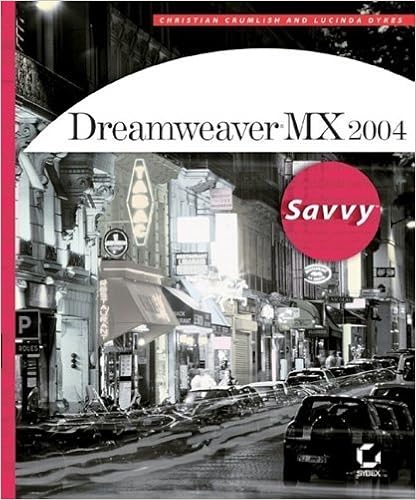
Read Online or Download ACM, Programming languages -- Past, Present, and Future - Sixteen Prominent Computer Scientiest Assess Our Field PDF
Best computers books
Making firm probability administration repay indicates how most sensible businesses are remodeling threat administration into an built-in, non-stop, greatly concentrated self-discipline that identifies and assesses dangers extra successfully, responds extra accurately, and discovers not only "downsides" yet leap forward possibilities to boot.
Here's the main complete advisor to the prime specialist visible website design device out there! whereas Dreamweaver appeals to designers who create sites with out coding or scripting and to builders who practice full-on programming, so does Dreamweaver MX 2004 Savvy. that includes a task-based technique mixed with step by step tutorials, this in-depth advisor is helping newcomers wake up to hurry speedy.
Download PDF by Stephen P. Olejniczak: VoIP Deployment For Dummies (For Dummies (Computer Tech))
So you’re in control of enforcing a VoIP telephone procedure in your association? VoIP Deployment For Dummies is a crash direction in Voice over web Protocol implementation! Here’s easy methods to research your community and enforce a VoIP mobilephone method, deal with and keep it, preserve it safe, and troubleshoot difficulties.
- Scrum and XP from theTrenches. How we do Scrum
- Die Computerspieler - Studien zur Nutzung von Computergames
- Computational Science and Its Applications – ICCSA 2010: International Conference, Fukuoka, Japan, March 23-26, 2010, Proceedings, Part III
- Attacks on Watermarking Systems
- IESC-WB-Vol 1-Tasks
Extra resources for ACM, Programming languages -- Past, Present, and Future - Sixteen Prominent Computer Scientiest Assess Our Field
Sample text
And I always gave examples of a couple of these very narrow languages. One of the examples I used was COGO. After one of my lectures, somebody came up to me and said that COGO was very useful to him because he was a civil engineer, and the notation in COGO was just the type of notation that Civil Engineers use in their written discourse. This was surprising to me, because I had no idea that the notation in COGO was based on Civil Engineer's written discourse or oral discussions, because I had never talked to a Civil Engineer or participated in their discussions.
A l i e n : First of all, they need to understand a variety of these languages. Secondly, I think they need to appreciate how these languages are used. I don't think we understand well enough the environment in which the people who are using them every day exist. And they should become skilled in a couple of very different languages. Dennis: Learn as much as you can about every- thing. Get a broad education. Ferrante: I would say, learn the basics. If they're going to be in the field and going to go off and get a job, they need to be able to understand the concepts and be able to solve problems using programming languages.
It doesn't matter what language a program is written in if the description of its purpose and use is incomprehensible. Tanenbaum: Be sure to spend lots of time pro- gramming. Sartlm~t: I'll deal with both the undergraduate and the graduate at the same time. I think the key language for them is Ada, because it is a very large language, and has a great many features and paradigms of which a few show up in other languages. So my advice to both of them would be that that is where they ought to concentrate their efforts and be sure 44 W 6 g l g l a l ' l : They should learn to write their programs so that they are maintainable and modifiable over time.
ACM, Programming languages -- Past, Present, and Future - Sixteen Prominent Computer Scientiest Assess Our Field
by Mark
4.4



